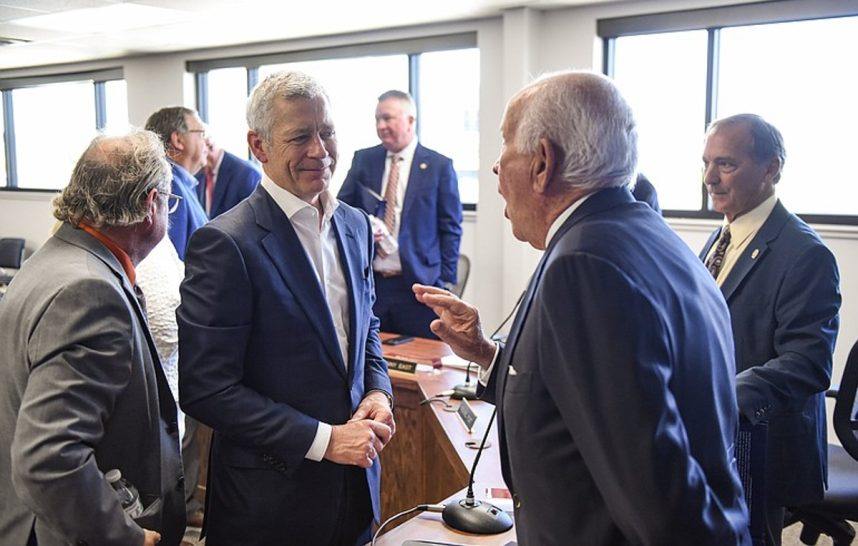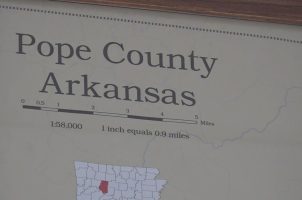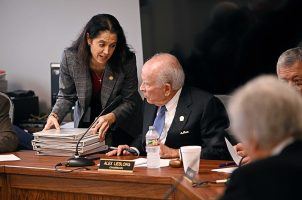Gulfside Casino Partnership Sue Arkansas Officials Over Pope County License
Posted on: July 4, 2024, 12:56h.
Last updated on: July 4, 2024, 07:29h.
Gulfside Casino Partnership alleges in a lawsuit filed in Arkansas’ Pulaski County Circuit Court that state officials colluded with a rival bidder regarding a gaming license earmarked for Pope County.

Mississippi-based Gulfside is controlled by riverboat pioneers Terry Green and Rick Carter. The businessmen own the Island View Casino in Gulfport.
Gulfside alleges in its complaint that Pope County Judge Ben Cross and the Pope County Quorum Court used coercive tactics to handpick the winner of the Pope County casino license. The 2018 ballot referendum statewide voters approved that authorized a single casino license in Pope County came with the requirement that applicants obtain a letter of support from the county judge or a resolution of support from the county quorum court to qualify for consideration before the Arkansas Racing Commission (ARC).
The lawsuit claims that Cross and a majority of the Pope Quorum Court conspired to disqualify Gulfside’s $405 million pitch called River Valley Casino Resort in Russellville to resolve the years-long legal dispute regarding the license.
Lawsuit Claims
Cross and the Pope Quorum Court by a 7-5 vote backed a competing casino bid from Cherokee Nation Entertainment, a subsidiary of Cherokee Nation Businesses (CNB), the commercial arm of the Cherokee Nation tribe in Oklahoma. The Cherokees proposed a $300 million casino called Legends Resort & Casino, also in Russellville.
Gulfside was initially deemed the winner for the Pope County casino concession in 2019 based on ARC commissioners’ grading of each bid. ARC later determined that one of its commissioners had a bias in grading the Gulfside plan a perfect 100/100 while only giving 29 points to the Cherokee proposal.
A Cherokee appeal reached the Arkansas Supreme Court, which ruled that Gulfside was not a qualified bidder because its letter of support came from a former county judge — not the current sitting county judge. ARC then gave the license to Legends, but Gulfside successfully appealed on grounds that the Cherokees also violated bidding rules by applying as a consortium and not as a single applicant.
The license was again returned to ARC and another bidding round ensued. Gulfside wrote in its complaint that Cross and the county quorum court conspired to make sure only the Cherokee plan could move forward. Gulfside attorneys say Cross and the quorum court developed an “Economic Development Agreement” with the Cherokees that assured the company with the support of the judge and court in exchange for a $38.88 million “economic development fee” that is to go to Pope County’s “related governmental entities.”
Judge Cross and the Quorum Court have used their power to issue a letter of support as a way to thwart the Racing Commission’s ultimate authority to select and award the casino gaming license,” the lawsuit declared.
The filing explained that the constitutional amendment voters passed did not limit county judges or county quorum courts from issuing more than one letter or resolution of support.
“The wording of the Amendment and the rules subsequently adopted by the Racing Commission recognizes that there would be multiple casino applicants each with a letter of support,” the lawsuit added.
Declaratory Judgment
Gulfside says it offered the better casino plan for Pope County and a richer economic development fee of $65 million. Compared with the Cherokees’ Legends project, Gulfside’s River Valley proposed 20,000 square feet of more gaming space, 300 more slot machines, 18 more table games, and 100 more hotel rooms.
Despite Gulfside’s proposal being superior in every aspect, because of the CNB EDA’s exclusivity requirement, the Quorum Court and County Judge refused to issue a resolution of support or letter of support to Gulfside,” the complaint continued.
The lawsuit asks the court to void the CNB EDA on grounds that it goes against public policy and to annul Cross’ letter of support and the quorum court’s resolution for the Cherokee bid. The lawsuit additionally asks the court to rescind ARC’s declaration that the Pope County casino license be awarded to Cherokee Nation Entertainment.
Related News Articles
Pope County Casino Bidding Period to Open This Summer
Arkansas Casino License for Pope County Has New Timeline
Most Popular
FTC: Casino Resort Fees Must Be Included in Upfront Hotel Rates
Genovese Capo Sentenced for Illegal Gambling on Long Island
NBA Referees Expose Sports Betting Abuse Following Steve Kerr Meltdown
UPDATE: Former Resorts World & MGM Grand Prez Loses Gaming License
Most Commented
-
UPDATE: Whiskey Pete’s Casino Near Las Vegas Closes
— December 20, 2024 — 31 Comments -
Caesars Virginia in Danville Now Accepting Hotel Room Reservations
— November 27, 2024 — 9 Comments -
UPDATE: Former Resorts World & MGM Grand Prez Loses Gaming License
— December 19, 2024 — 8 Comments -
FTC: Casino Resort Fees Must Be Included in Upfront Hotel Rates
— December 17, 2024 — 7 Comments
















Last Comments ( 4 )
It’s petty at this point. You sue just to sue. Poor losers make bad business partners. Might as well go down the road and look to build elsewhere. We don’t want, nor need you in our town.
Where has Gulfside been? Legends has been here in our county. Never left pays taxes here and is at every community event. Where's Gulfside? Definitely not present. I think Pope county has been pretty upfront with who we want in this county. Gulfside has done nothing but delay this over and over again. They are not present here they have not built residential standings here. They have not shown any type of commitment to our county. Gulfside needs to tuck their tails and go home. They are not wanted here. Quit trying to just delay the obvious. We are legendary through and though.
With the history of bad financial decisions on the part of Gulfside’s Green and Carter, and their original multi-stage plan that likely never would have fully come to fruition leaving us with a less than desirable casino, much less a resort, I don’t think that GS is the right group for the job. With just a little bit of digging into the backgrounds, it’s easy to find info that makes one think twice about entrusting them to do this job. Cherokee has been in our community for years now, showing up and helping our community in various ways. Gulfside hasn’t been here doing a darn thing.
Regardless of the EDA, Judge Cross and the quorum court would not have given Gulfside a letter or resolution of support. Terry Green promised in 2019 that Gulfside would sue if they didn't get a letter of support. Who knew then that five years later, they would still be litigating over the same thing?